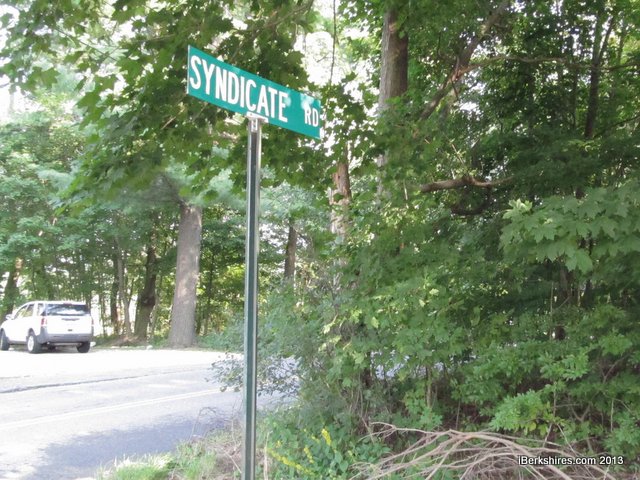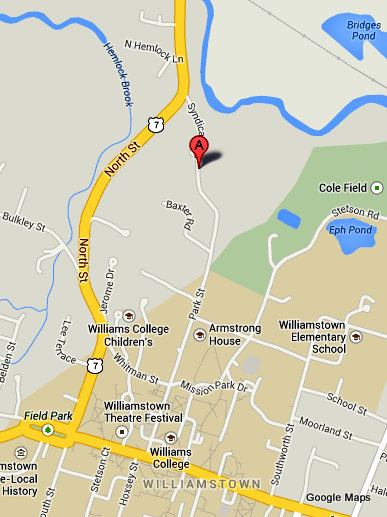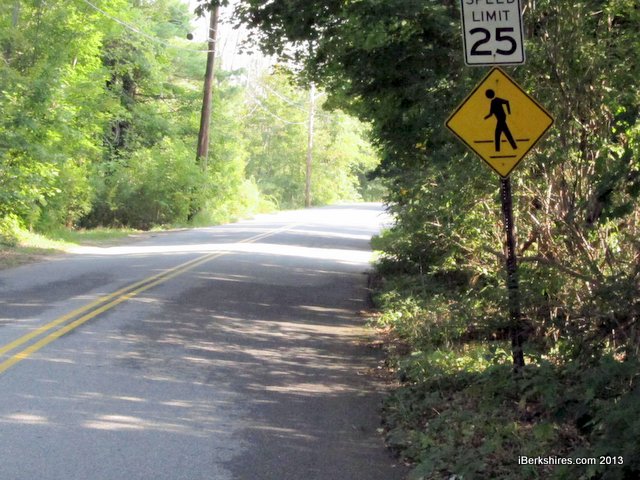Williamstown Looks at Truck Traffic on Syndicate Road
 Residents are concerned about truck traffic along the narrow road. Residents are concerned about truck traffic along the narrow road. |
|
 |
 |
WILLIAMSTOWN, Mass. — The Selectmen on Tuesday decided to issue a call for courtesy to truck drivers passing through the Syndicate Road and Park Street neighborhood.
But it stopped short of complying with the residents' request to pursue closing the road to through commercial traffic.
Jay Pasachoff of Park Street represented the neighborhood at Tuesday's meeting and explained that his group hoped the town could create the same prohibition currently in place on Bridges, Sand Springs and North Hoosac roads.
"We think if there was a ban and a sign, it would deter people," Pasachoff told the board, which was meeting a day later than usual because of the Monday holiday.
"One can certainly make the case that our request makes sense in light of what's already banned [on North Hoosac]."
The problem, residents say, is that commercial vehicles use the winding, narrow Syndicate Road (which turns into Park Street) as a shortcut to get from North Street (Route 7) to Main Street (Route 2) without going around the Field Park rotary.
After receiving the residents' request, the Police Department made a study of traffic in the Syndicate Road/Park Street corridor and found that the majority of trucks with six wheels or more were on the roads because they were headed to local destinations.
In a six-day period, police officers counted about 224 trucks of all sizes, Police Chief Kyle Johnson reported.
"Fifty-one vehicles in total were perceived to be cutting through in that six-day period," he said.
And among really big trucks — those with 10 wheels or more — the percentage of "cut throughs" was even smaller. Just two of 25 of the larger trucks were believed to be passing through, Johnson said.
Much of the truck traffic on the roads was headed to nearby Williams College buildings, including food delivery trucks or vehicles related to the Stetson-Sawyer Library construction project. Other trucks were there to serve the neighborhood itself, including delivery and landscapers' vehicles.
Johnson said even if the road was closed to through commercial traffic, there are logistical concerns that make it difficult to enforce such a rule.
"The problem with the ban on [on North Hoosac] is we have to physically see the vehicle enter the road and leave the road before we know there's a violation," he said. "I understand the prohibition, but it's very impractical to enforce. ... We have to see the violation committed. We can't assume they're not making a local delivery."
In response to a question from Selectman Tom Sheldon, Johnson said stops for violations of the through-truck rule are rare.
"We do not make stops for that violation very often," Johnson said. "We do see commercial vehicles [on North Hoosac], but they go up Henderson Road or they go to the lumber yard."
And while North Hoosac is a popular shortcut for drivers — commercial and otherwise — to get from Vermont to North Adams without going on Main Street in Williamstown, it is less clear that the Syndicate Road route saves any time.
"I can get to North Adams from Vermont faster going around Field Park than waiting to make a left turn at that intersection at Park Street [and Main Street]," Town Manager Peter Fohlin said.
But Pasachoff said that drivers who rely on GPS devices are frequently directed through the Syndicate Road/Park Street neighborhood.
Selectmen sympathized with the neighbors' situation but noted that the town does not have the authority to ban through commercial traffic. Such a restriction would be issued by the Massachusetts Department of Transportation, which first would require an engineering study. Fohlin advised the board that such a study would cost between $5,000 and $7,000.
Rather than take such a step, the board voted to authorize Fohlin to draft a letter to some of the businesses frequently identified by the police as users of the Syndicate Road/Park Street route. The letter will ask the businesses to ask their drivers to be more considerate of the residents.
Fohlin said such letters can have a beneficial effect. A few years ago, he communicated with a trucking company whose drivers he noticed were behaving discourteously on the Field Park rotary.
"[The owner] called me and expressed the same concern I had," Fohlin said.
 Park Street resident Jay Pasachoff represented the neighborhood. Park Street resident Jay Pasachoff represented the neighborhood. |
More importantly, the behavior changed.
"In the letter I just wrote [the same company], I said I can recall only two times when their drivers were blowing their horn over the last two years, and I don't recall any who were speeding," Fohlin said.
In other business on Tuesday night, the Selectmen heard concerns from two residents of the Spruces Mobile Home Park about the uncertain timing of the process related to the town's acquisition of the park, the compensation of residents from the proceeds of a federal Hazard Mitigation Grant and the possibility of building replacement housing.
"Morale in the park is very bad," Loretta Martin told the board. "When will you have a town meeting and when will the residents get paid? There are a lot of people in there who would like to buy a new mobile home but can't even look."
Fohlin explained that the town continues to fine tune the agreement with park owner Morgan Management, and that those talks remain friendly and productive. He said he hopes to be able to bring a draft special town meeting warrant article to the Selectmen at its Oct. 28 meeting, and if that happened, the meeting itself could be called as early as Nov. 19.
"If not Nov. 19, Dec. 10 is the next logical date," Fohlin said, cautioning that the timeline is not set in stone.
Fohlin said the town is advertising for a relocation agent, who will coordinate dispersal of the residents' share of the grant money.
A second Spruces resident, Charlene Blood, asked for an update on the town's efforts to build affordable housing. Sheldon, who serves on the town's Affordable Housing Trust, told her that there are two main efforts under way: the private non-profit Higher Ground's project at the end of Southworth Street and the town Affordable Housing Committee's objective of developing two town-owned brownfield sites.
Higher Ground and its partners are optimistic about having some housing in place within the two to three years that Spruces residents have before the park is closed, Sheldon said. And the AHC is in the process of drafting requests for proposals to send to developers; Chairwoman Catherine Yamamoto, who attended Tuesday's meeting, said the committee hopes to have RFPs out by late November.
Yamamoto also used Tuesday's meeting to ask the Selectmen to carefully consider how to deal with the 114 acres of land that the town will acquire under terms of the Federal Emergency Management Agency grant. Yamamoto pointed out that with developable land at a premium in town, the town should look carefully at what can be allowed under the grant, which specifies that a "FEMA Model Deed Restriction" be placed on the park's land.
"I think there is room for negotiation," Yamamoto said. "[That negotiation] might include the entity in charge of the property. We ask that the Board of Selectmen and town counsel carefully consider it."
Tags: roads, traffic, trucks,















